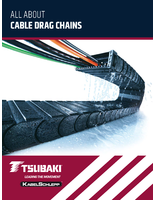Hybrid Thermoplastic Composites come in PP and ETPU.
Press Release Summary:

Combining long glass fiber and long carbon fiber together in single, ready-to-mold pellet, Complet® Hybrid Composites are available in polypropylene and engineered thermoplastic polyurethane. Single pellet solution for combining long glass and carbon fiber provides optimized fiber dispersion, which minimizes performance reductions due to fiber attrition during processing. In addition to automotive sector, hybrid composites are suitable for use in consumer and sporting goods products.
Original Press Release:
PlastiComp Expands Hybrid Long Glass+Carbon Fiber Thermoplastic Composite Materials Line
WINONA, MINN., USA – PlastiComp, Inc., a global leader in long fiber thermoplastic (LFT) materials and technologies, announced that it has commercialized its innovative Complet® Hybrid long glass+carbon fiber composites in two additional thermoplastic polymer matrices. Their hybrid products, which combine long glass fiber and long carbon fiber together in a single, affordable ready-to-mold composite pellet, are now available in polypropylene (PP) and engineered thermoplastic polyurethane (ETPU), last year they were initially introduced in nylon 6/6 (PA 6/6).
“PlastiComp’s hybrid long glass+carbon fiber products nicely fill the performance and price gap that exists between long glass fiber and long carbon fiber reinforced thermoplastic composites,” said Steve Bowen, president and CEO of PlastiComp. “Carbon fiber’s higher cost is the only real disadvantage preventing its wider use. By offering long glass and carbon fiber combinations we are able to significantly lower carbon fiber’s cost to entry barrier without compromising its high performance benefits.”
“After PlastiComp introduced our nylon 6/6 long fiber hybrids last year we were able to quickly commercialize them in a sporting goods application,” said Bowen. “Long glass fiber couldn’t provide enough stiffness to eliminate a metal insert and long carbon fiber options were cost prohibitive. When they trialed one of our long glass+carbon fiber hybrids it was an instant success, it met their stiffness requirements at a price point that allowed them to take an all-composite version of their product to market.”
The performance spectrum achievable with long glass+carbon fiber hybrids is virtually infinite according to Eric Wollan, technical director at PlastiComp. “If durability is a concern we can formulate a product that has more long glass fiber to improve impact resistance, if higher load carrying ability is needed then we move to products that include additional long carbon fiber to increase stiffness and strength,” said Wollan. “Hybrids really provide a lot more material options for product designers and engineers to better balance performance versus cost instead of having just all-glass or all-carbon reinforcement choices.
“The automotive sector has been adopting long glass fiber polypropylene for a couple of decades because it offers a significant weight reduction compared to traditional metal components,” said Wollan. “To meet increasing fuel economy regulations they still need to go lighter, but LFT-PP can’t get any stronger and jumping straight to carbon fiber is a bold economic step for a price-sensitive industry. Using our long glass+carbon hybrids we can incorporate carbon fiber in small increments to achieve the performance boost needed to switch more components from metal to plastic while keeping material costs reasonable.”
“In consumer and sporting goods markets carbon fiber has become synonymous with ‘high tech’ and its use adds perceived value to products enabling many to demand a price premium,” said Wollan. “Including low levels of carbon fiber creates a legitimate ‘carbon fiber composite’ and can be used to upsell products or differentiate them from competitors whose products might not be seen as high quality because they are made from lower performing materials.”
The addition of polypropylene and polyurethane grades gives PlastiComp’s hybrid long glass+carbon fiber product line broader appeal and is further extendable to other engineering polymers as market demand develops. PlastiComp’s single pellet solution for combining long glass and carbon fiber provides better fiber dispersion, which minimizes performance reductions due to fiber attrition during processing, than post-blending separate glass and carbon fiber pellets.
Wollan will deliver a presentation, “Hybrid Long Fiber Thermoplastic Composites: A Perfect Blend of Performance and Cost,” during the advances in thermoplastic composites session at the upcoming Society of Plastics Engineers’ Automotive Composites Conference & Exhibition taking place in Novi, Mich. from Sept. 9-11, 2015.
As a fully integrated long fiber compounder, PlastiComp provides product design and performance analysis assistance when converting applications to new materials as well as partnership opportunities during OEM new product development initiatives for which PlastiComp can customize their LFT materials to meet specific performance criteria.
For more information on PlastiComp’s hybrid long glass+carbon fiber composites or their other LFT products and technologies, please call +1 507-858-0330, e-mail info@plasticomp.com, or visit their website at www.plasticomp.com.
About PlastiComp
PlastiComp, Inc. focuses on developing and providing long fiber reinforced thermoplastic composite technologies to partners worldwide. These include ready-to-process long fiber thermoplastic (LFT) pelletized composites along with process development and manufacturing equipment licensing for LFT pultrusion, in-line direct long fiber thermoplastic (D-LFT) Pushtrusion®, and in-line direct glass mat thermoplastic (D-GMT®) technologies. PlastiComp’s injection moldable Complçt® LFT composites are available as standard and custom engineered formulations that combine long glass, carbon, and other specialty fiber reinforcement with thermoplastic polymers from polypropylene to PEEK.
PlastiComp®, Complçt®, Velocity®, Pushtrusion®, and D-GMT® are registered trademarks of PlastiComp, Inc.




